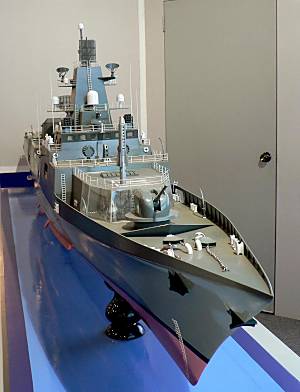BLOOMINGTON, Ind., Aug. 31, 2011 — Special operations staff members are working to ensure the organization retains its technological edge on the battlefield, a Joint Special Operations Command staff officer said.
Army Maj. Brian Weyenberg, science and technology lead for JSOC’s force structure, resources and assessment directorate, yesterday described current and near-term capability gaps in special operations for an audience attending the National Defense Industrial Association’s Joint Missions Conference here.
A sub-command of U.S. Special Operations Command, which is based at MacDill Air Force Base, Fla., the Fort Bragg, N.C.-based JSOC is a joint headquarters designed to study special operations requirements and techniques, ensure interoperability and equipment standardization, plan and conduct joint special operations exercises and training, and develop joint special operations tactics.
Perhaps the most pressing concern for that headquarters — what he termed as “the 800-pound gorilla” — is the possibility of major funding cuts, Weyenberg said.
“While there is no indication yet that the budget deficit issues touching our nation will affect [special operations forces] or SOF resourcing … we must all be prepared for that,” he said.
One resourcing consideration for the special operations community is determining when “SOF-unique” equipment or systems can be replaced with service-common solutions, Weyenberg said.
Another area of possible savings is transferring “mature technology” — proven systems and equipment — from national to theater missions whenever possible to reduce costs, he added.
Weyenberg said a special operations imperative is developing new capabilities to support its core mission: to find, fix, exploit and analyze the enemy; in military parlance, F2EA. That requirement “mandates SOF to operate and collaborate as an interagency partner and pool resources to counter and exploit commercial technologies,” he said.
SOCOM’s spending to support F2EA capabilities has expanded and likely will keep growing, Weyenberg said, given increasing mission demand across the globe.
“Expanding our [science and technology] focus and capabilities also increases their endurance,” he said. “Innovation and speed-to-market are essential to staying abreast of the commercial marketplace’s capabilities and services … available and used by our tech-savvy adversaries.”
Science and technology development is inherently distant from the fight, he said, and focuses on deliverable products or capabilities.
“Within SOF’s doctrine of find, fix, exploit and analyze, [resources] will continue to be the engine of success,” he said. “The franchising of the violent extremist networks continues. Additionally, the Arab spring remains unpredictable and exploitable by groups that could use terrorism as a means to an end.”
Weyenberg said given these threats, geo-location and over-the-horizon surveillance are and will remain key “find and fix” capabilities, requiring integrated sensors and networks that can deliver both point and area surveillance, allow users to develop pattern-of-life data, and provide over-the-horizon cues for aerial assets.
“We have made great progress and must continue developing and building software-based survey and geo-location systems,” he said. “Additionally, we will need to continue to expand SOF … beyond-line-of-sight capabilities to gain greater range and freedom of access.”
Another critical need, he said, is to further develop command, control, communications, computers, and intelligence — “C4I” — systems that can link a globally dispersed force and allow access to partner organizations.
“Information sharing, and interoperability within the interagency environment, is a critical angle,” he said. “Such technologies, tools and architectures, which improve our ability to search, parse, analyze, destroy and distribute data, increasingly become … requirements for us.”
JSOC is working, in part through interagency and inter-service collaboration and its science and technology task force, to bridge the gap between mission requirements and new capabilities, Weyenberg said.
As operations in Iraq wind down and Afghan forces gradually assume security responsibility for their country, U.S. special operations troops “will continue to be the nation’s force of choice for difficult and politically sensitive missions,” he said.
Source:
U.S. Department of Defense
Office of the Assistant Secretary of Defense (Public Affairs)

 von
von 